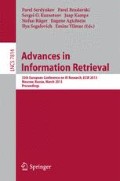Abstract
The goal of this research is to devise a method for recognizing and classifying TimeML events in a more effective way. TimeML is the most recent annotation scheme for processing the event and temporal expressions in natural language processing fields. In this paper, we argue and demonstrate that unit feature dependency information and deep-level WordNet hypernyms are useful for event recognition and type classification. The proposed method utilizes various features including lexical semantic and dependency-based combined features. The experimental results show that our proposed method outperforms a state-of-the-art approach, mainly due to the new strategies. Especially, the performance of noun and adjective events, which have been largely ignored and yet significant, is significantly improved.
Access this chapter
Tax calculation will be finalised at checkout
Purchases are for personal use only
Preview
Unable to display preview. Download preview PDF.
References
Allan, J.: Topic Detection and Tracking: Event-Based Information Organization. Kluwer Academic Publishers, Norwell (2002)
Bethard, S., Martin, J.H.: Identification of event mentions and their semantic class. In: The 2006 Conference on Empirical Methods in Natural Language Processing, pp. 146–154. Association for Computational Linguistics, Stroudsburg (2006)
Boguraev, B., Ando, R.: Effective Use of TimeBank for TimeML Analysis. In: Schilder, F., Katz, G., Pustejovsky, J. (eds.) Reasoning about Time and Events. LNCS (LNAI), vol. 4795, pp. 41–58. Springer, Heidelberg (2007)
Daniel, N., et al.: Sub-event based multi-document summarization. In: The HLT-NAACL 2003 on Text Summarization Workshop, pp. 9–16. Association for Computational Linguistics, Stroudsburg (2003)
Hobbs, J., Pustejovsky, J.: Annotating and Reasoning about Time and Events. In: The 2003 AAAI Spring Symposium on Logical Formalizations of Commonsense Reasoning. AAAI Press (2003)
Jeong, Y., Myaeng, S.-H.: Using Syntactic Dependencies and WordNet Classes for Noun Event Recognition. In: The 2nd Workhop on Detection, Representation, and Exploitation of Events in the Semantic Web in Conjunction with the 11th International Semantic Web Conference, pp. 41–50 (2012)
Llorens, H., et al.: TimeML events recognition and classification: learning CRF models with semantic roles. In: The 23rd International Conference on Computational Linguistics, pp. 725–733. Association for Computational Linguistics, Stroudsburg (2010)
March, O., Baldwin, T.: Automatic Event Reference Identification. In: The Australasian Language Technology Workshop, pp. 79–87 (2008)
McCallum, A.K.: MALLET: A Machine Learning for Language Toolkit, http://mallet.cs.umass.edu/
Pustejovsky, J., et al.: Temporal and Event Information in Natural Language Text. In: Bunt, H., et al. (eds.) Computing Meaning. Studies in Linguistics and Philosophy, pp. 301–346. Springer, Netherlands (2007)
Pustejovsky, J.: TERQAS: Time and Event Recognition for Question Answering Systems. In: ARDA Workshop (2002)
Pustejovsky, J., et al.: The TIMEBANK Corpus. In: The Corpus Linguistics 2003 Conference, pp. 647–656 (2003)
Pustejovsky, J., et al.: TimeML: Robust Specification of Event and Temporal Expressions in Text. In: The 5th International Workshop on Computational Semantics (2003)
Saurí, R., et al.: Evita: a robust event recognizer for QA systems. In: The Conference on Human Language Technology and Empirical Methods in Natural Language Processing, pp. 700–707. Association for Computational Linguistics, Stroudsburg (2005)
Witten, I.H., et al.: Data Mining: Practical Machine Learning Tools and Techniques. Morgan Kaufmann, San Francisco (2011)
Zhang, T., et al.: Text chunking based on a generalization of winnow. The Journal of Machine Learning Research 2, 615–637 (2002)
Author information
Authors and Affiliations
Editor information
Editors and Affiliations
Rights and permissions
Copyright information
© 2013 Springer-Verlag Berlin Heidelberg
About this paper
Cite this paper
Jeong, Y., Myaeng, SH. (2013). Using WordNet Hypernyms and Dependency Features for Phrasal-Level Event Recognition and Type Classification. In: Serdyukov, P., et al. Advances in Information Retrieval. ECIR 2013. Lecture Notes in Computer Science, vol 7814. Springer, Berlin, Heidelberg. https://doi.org/10.1007/978-3-642-36973-5_23
Download citation
DOI: https://doi.org/10.1007/978-3-642-36973-5_23
Publisher Name: Springer, Berlin, Heidelberg
Print ISBN: 978-3-642-36972-8
Online ISBN: 978-3-642-36973-5
eBook Packages: Computer ScienceComputer Science (R0)

